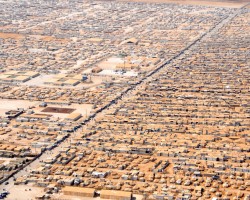Amid Mounting Security Challenges in Syria, Humanitarian Crisis Reaches New Heights
As the security situation inside Syria becomes increasingly complex, intelligence agencies are focusing concern on the role of extremists in the conflict, particularly Westerners joining the fight. At the same time, the international effort with regime cooperation is advancing toward the removal of chemical weapons in accord with the September agreement. Yet, despite the cooperation on the chemical weapons issue, both the pro-Assad forces and the opposition are obstructing deliveries of humanitarian assistance. This obstruction is worsening the already dire humanitarian situation on the ground. While the need for a political resolution to the Syrian civil war remains central to addressing the humanitarian crisis, there are concrete steps that the international community can take to improve the situation.
In complicated conflict, the already massive humanitarian crisis continues to worsen daily. Morton Abramowitz, who has served as ambassador to Turkey, lays out the dire situation on the ground in Syria: “more than 6 million left homeless. Nine million people need humanitarian assistance. More than 2 million Syrians are refugees in neighboring countries. More than 3 million others are now beyond the reach of humanitarian agencies, according to the United Nations. All of these numbers increase daily.” Abramowitz calls on the American public to voice a stronger opinion, stating “Those who care must rally around a common banner of pressing the U.S. government to urgently take extraordinary steps to save many more Syrians.”
Earlier this week in a briefing to the Security Council Valerie Amos, the top emergency relief official at the United Nations, expressed increased alarm about the humanitarian crisis caused by the civil war. Complicating the situation, both sides are impeding aid delivery. Human Rights Watch reports, “Syrian government and some opposition forces are preventing the delivery of humanitarian assistance to hundreds of thousands of civilians in areas under siege in Syria… people are suffering from an increasingly severe shortage of food and that people are dying from lack of medical care because of the siege.” The New York Times explains that, “Syrian authorities had been permitting aid convoys from Lebanon, Jordan and Iraq, but had refused to allow any from Turkey, which the Syrian government has accused of abetting the insurgency.” Human Rights Watch adds, “Opposition fighters in northern Syria are preventing humanitarian assistance from reaching tens of thousands of people trapped in two Shia villages just north of the city of Aleppo.” [Morton Abramowitz, 12/6/13. NY Times, 12/3/13. Human Rights Watch, 12/3/13]
Moving forward, what more can be done. Dr. Kristalina Georgieva, the European Commissioner for International Cooperation, Humanitarian Aid, and Crisis Response, and others have offered concrete steps that the international community can take to improve the humanitarian situation on the ground:
Continued and smarter assistance. Georgieva writes, “we need to continue to be generous in providing humanitarian assistance… I strongly believe that we need to continue to increase our presence inside Syria and deliver assistance through all possible channels, in spite of the huge constraints… I see a moral imperative to continue pushing for more funding.”
Develop comprehensive approach for refugee host countries. The massive influx of refugees from Syria puts a strain on already stressed host countries, and “as this crisis is now a protracted one, we need to develop a comprehensive approach for the host countries, one that combines development, macro-financing, and humanitarian assistance.” Other observers have noted the need to think beyond the refugee camps. Most refugees in the region do not live in camps, but are instead in urban areas. The strategy for long-term support should reflect this by protecting the most vulnerable and preserving space for asylum.
Improving access. With the increasing obstruction of assistance delivery on the ground, “the international community needs to prioritize resolving problems of humanitarian access.” This includes, “more visas for international NGOs and less obstruction in authorizing convoys and deliveries.”
Continuing to provide safety for refugees. “Last but not least, we call on Syria’s neighbors to keep their borders open to incoming refugees. The European Union and others must do the same. Solidarity with people in dire need is a core European value, shared by Americans and others.” For the long term, this will require faster action on resettlement of refugees, to show Syrians and neighboring countries that we are also in this with them for the long haul.
[Kristalina Georgieva, 10/15/13]


